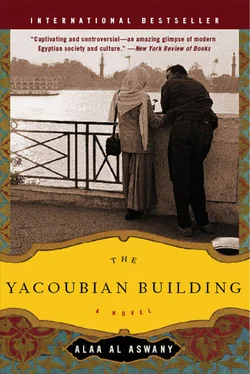Alaa Al Aswany - The Yacoubian Building
Здесь есть возможность читать онлайн «Alaa Al Aswany - The Yacoubian Building» весь текст электронной книги совершенно бесплатно (целиком полную версию без сокращений). В некоторых случаях можно слушать аудио, скачать через торрент в формате fb2 и присутствует краткое содержание. Год выпуска: 2006, ISBN: 2006, Издательство: Adobe Acrobat eBook Reader, Жанр: Современная проза, на английском языке. Описание произведения, (предисловие) а так же отзывы посетителей доступны на портале библиотеки ЛибКат.
- Название:The Yacoubian Building
- Автор:
- Издательство:Adobe Acrobat eBook Reader
- Жанр:
- Год:2006
- ISBN:978-0-06-087813-9
- Рейтинг книги:5 / 5. Голосов: 1
-
Избранное:Добавить в избранное
- Отзывы:
-
Ваша оценка:
- 100
- 1
- 2
- 3
- 4
- 5
The Yacoubian Building: краткое содержание, описание и аннотация
Предлагаем к чтению аннотацию, описание, краткое содержание или предисловие (зависит от того, что написал сам автор книги «The Yacoubian Building»). Если вы не нашли необходимую информацию о книге — напишите в комментариях, мы постараемся отыскать её.
The Yacoubian Building — читать онлайн бесплатно полную книгу (весь текст) целиком
Ниже представлен текст книги, разбитый по страницам. Система сохранения места последней прочитанной страницы, позволяет с удобством читать онлайн бесплатно книгу «The Yacoubian Building», без необходимости каждый раз заново искать на чём Вы остановились. Поставьте закладку, и сможете в любой момент перейти на страницу, на которой закончили чтение.
Интервал:
Закладка:
As for Ali the Driver, he’s an alcoholic, over fifty, never married, who works as a driver at the Holding Company for Pharmaceuticals, going straight from work every day to the Orabi Bar in El Tawfikiya, where he eats and sits sipping a drink until midnight. Loneliness and the cheap alcohol to which he is addicted have had their effect on him, making him gross, violent, and ever in search of a quarrel on which to expend his aggression.
Mr. Hamid Hawwas approached Malak and greeted him, then opened the conversation in an extremely refined way by saying, “About this room, my friend. Do you have a contract from the owner of the building giving you the right to use it as a commercial establishment?”
“Of course I have a contract,” answered Malak excitedly, and he pulled out of his small leather purse a copy of the contract that he had signed with Fikri Abd el Shaheed. Hamid took the piece of paper, put on his glasses, and examined it carefully. Then he handed it back to Malak, saying quietly, “The contract is invalid in this form.”
“Invalid?” repeated Malak, apprehensively.
“Of course invalid. According to the law the roof is a common resource for the residents and a common resource may not be rented out for commercial purposes.”
Malak didn’t understand and stared angrily at Mr. Hamid, who went on to say, “The Court of Cassation has issued more than one ruling on the issue and the matter is closed. The contract is invalid and you have no right to the use of the room.”
“Yes, but all of you are living on the roof, so why not me?”
“We are employing our rooms for residential purposes, and that is legal. You, however, are exploiting your room for commercial ends, and that is illegal and we cannot allow it.”
“Okay. Go complain to the owner of the place since he’s the one who gave me the contract.”
“Certainly not. The law itself forbids you to make use of the room, and we, as injured residents, are obliged to prevent you.”
“What does that mean?”
“ It means you’d better get a move on and scram or else! ”
These last words were spoken by Ali the Driver in his husky voice as he looked challengingly at Malak. Laying his hand on Malak’s shoulder in a clearly threatening way, he went on, “Listen, sonny boy. This roof is for respectable folk. You can’t just turn up here in your own sweet time and open a shop, with workers and customers looking at the ladies going in and out. Got it?”
Malak, who now felt the danger of the situation, responded quickly, “My dear sir, all my workers are educated people, praise God! They’re the most polite and discreet people in the world. And the people living on the roof and their ladies have my utmost respect.”
“Listen. Forget the chitchat. Pick up your stuff and get going!”
“Dear me! What’s going on? Are you going to behave like ruffians or what?”
“That’s it, momma’s boy, we’re going to behave like ruffians.”
As Ali the Driver said this, he pulled Malak toward him by his collar and gave him a slap to announce that battle was about to commence. He conducted his quarrels with ease and proficiency as though he were carrying out simple, routine procedures or practicing a sport of which he was fond. He started with a well-placed head butt at Malak, followed by two punches to the stomach and a third, powerful and audible, that struck his nose. A thread of blood flowed down Malak’s face and he tried to resist by aiming a useless, symbolic punch at his opponent, but it missed. Then as violent blows fell on him, he started screaming in protest and chaos reigned, while the workmen, not wanting problems, quietly fled and people gathered from every direction to watch. Abaskharon appeared suddenly on the roof and started screaming and wailing for help and the fight continued until Ali the Driver succeeded in expelling Malak from the room.
Mr. Hamid Hawwas had slipped away at the beginning and called the Emergency Response Police from the telephone in the cigarette stand on the opposite side of the street and it wasn’t long before a young police officer and a number of policemen and goons took everyone involved into custody — Malak, his assistants, Abaskharon, and Ali the Driver.
Approaching the officer, Hamid Hawwas greeted him politely and said, “You’ve studied law, of course, sir. Now our friend here” — pointing to Malak — ”wants to open a commercial establishment on the roof, while the roof is a common resource that may not be exploited commercially. As you know full well, sir, this is a crime, known in legal terminology as ‘extortion of possession,’ and is punishable by imprisonment for a period of up to three years.”
“Are you a lawyer?” the officer asked Mr. Hamid, who responded confidently, “No, sir. I, sir, am Hamid Hawwas, deputy director of auditing in the National Sanitation Authority, El Mansoura Branch. Equally, I am one of the residents whose rights to the common resource of the roof have been usurped. How could the owner, my dear sir, go and rent the roof for a commercial purpose? This is a flagrant attack on the common resources of the residents. If he gets away with this, he could rent out the elevator, or the entrance to the building! Has the country gone to the dogs or what?”
Mr. Hamid Hawwas posed the last question with a theatrical flourish, looking hard at the assembled residents, who, stirred by his words, muttered in protest. Confusion appeared on the young officer’s face, and after thinking for a little he said disgustedly, “Okay, come on. Everyone to the station!”

Dr. Hassan Rasheed was a leading figure in the law in Egypt and the Arab world. Like Taha Hussein, Ali Badawi, Zaki Naguib Mahmoud, and others, he was one of the great intellectuals of the 1940s who completed their higher studies in the West and returned to their country to apply what they had learned there — lock, stock, and barrel — within Egyptian academia. For people like them, “progress” and “the West” were virtually synonymous, with all that that entailed by way of positive and negative behavior. They all had the same reverence for the great Western values — democracy, freedom, justice, hard work, and equality. At the same time, they had the same ignorance of the nation’s heritage and contempt for its customs and traditions, which they considered shackles pulling us toward Backwardness from which it was our duty to free ourselves so that the Renaissance could be achieved.
During his studies in Paris, Dr. Rasheed met a French woman, Jeanette, and fell in love with her. Then he brought her with him to Egypt and married her and they had their only son, Hatim. The family lived a life that was European in both form and essence. Hatim could not remember ever seeing his father pray or fast. The pipe never left his mouth, there was always French wine at his table, the most recent records from Paris resounded through the house, and French was the main language of conversation at home. In the Western manner, everything about the family’s life took place according to a set time and schedule, Dr. Rasheed even setting aside special times during each week for meeting friends and relatives and writing his personal correspondence.
The fact is that in addition to his exceptional mental capacities he possessed an astonishing appetite for uninterrupted work and was able in two decades to bring about a real blossoming of Egyptian civil law studies. With time his star rose till he assumed the deanship of the Faculty of Law at Cairo University. Then the International Law Society in Paris chose him as one of the hundred most prominent lawyers in the world.
Since Dr. Rasheed was always absorbed in his research and lecturing and because his wife Jeanette’s job as a translator at the French embassy occupied all her time, their son Hatim spent his childhood sad and lonely, to the point that in contrast to all other children he even liked school days and hated the long summer vacations, which he spent on his own with no friends to play with. And along with the painful loneliness, there were the feelings of alienation and mental confusion from which the children of mixed marriages suffer.
Читать дальшеИнтервал:
Закладка:
Похожие книги на «The Yacoubian Building»
Представляем Вашему вниманию похожие книги на «The Yacoubian Building» списком для выбора. Мы отобрали схожую по названию и смыслу литературу в надежде предоставить читателям больше вариантов отыскать новые, интересные, ещё непрочитанные произведения.
Обсуждение, отзывы о книге «The Yacoubian Building» и просто собственные мнения читателей. Оставьте ваши комментарии, напишите, что Вы думаете о произведении, его смысле или главных героях. Укажите что конкретно понравилось, а что нет, и почему Вы так считаете.












